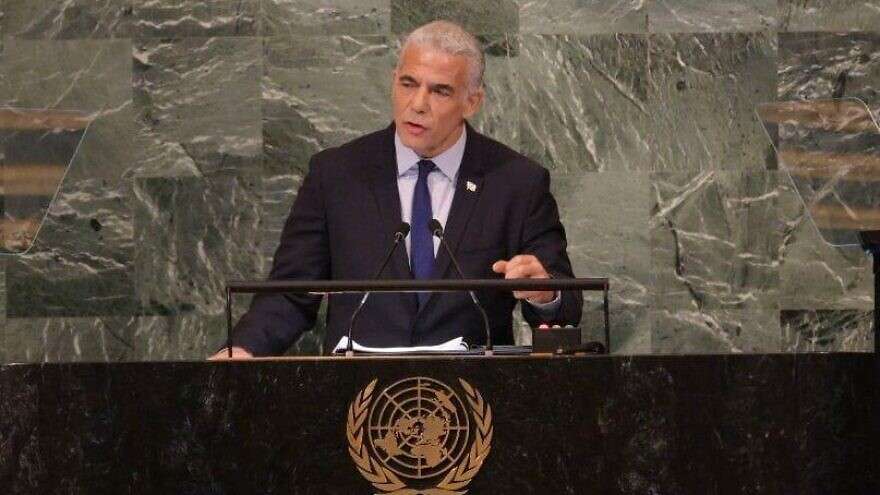For several years, the two-state solution has been almost entirely absent from Israeli political discourse. Moreover, scholars and pundits alike have continuously eulogized the idea saying that two states for two peoples is no longer a relevant and feasible proposal for ending the Israeli-Palestinian conflict.
Israeli Prime Minister Yair Lapid’s highly anticipated speech at the UN General Assembly in New York on Thursday seemingly gave a fresh breath of life to the two-state solution, as he declared his support for the idea on this important international stage, saying that “the two-state solution is the right thing for Israel’s security, its economy and our children’s future.” Lapid added, “Peace is not weakness…peace is the victory of all that is good.”
Unsurprisingly, leaders of Israel’s right-wing political parties released staunch reactions. Most of them warned of the potential security dangers that an independent Palestinian state could produce. Chairman of the Religious Zionism party Bezalel Smotrich called the idea “dangerous,” saying that “Gantz and Lapid are bringing Israel back to the disastrous Oslo track,” referring to the peace process that took place in the 1990s.
See: For Israel To Be Safe It Must Bury the Oslo Delusion
The official Twitter account of the Likud also released a statement:
“For years Netanyahu successfully removed the Palestinian issue from the world agenda and now, less than a year later, Lapid brought Abu Mazen back to center stage.”
Lapid also received criticism from the centrist National Unity Party led by Benny Gantz. In an interview this morning on Israel’s Reshet Bet radio station, MK Hili Tropper presented an alternative position, saying that the two-state solution simply is not practical. “We are in the middle of an election season, I don’t think that this is the time to speak about such a controversial topic on the most important platform,” he said. Instead, he suggested that Israel needs to engage in “shrinking the conflict,” adding that “dreams need to meet reality.”
A case of electioneering
What can we make of Lapid’s decision to suddenly announce Israeli support for a two-state solution?
This is clearly a case of election campaign politics. He delivered his first speech on the most important international stage which received broad news coverage in Israel. Revamping the two-state solution allows him to strengthen his position as leader of the center-left camp, whose parties are generally part of what is referred to as the “peace camp,” showing that he has a vision for bringing about a permanent solution to the Israeli-Palestinian conflict.
That being said, expressing explicit support for a two-state solution certainly will not strengthen the center-left bloc. It is an effort to enable Lapid’s Yesh Atid to attract voters from other parties that already hold similar values within the same bloc. In addition, expressing support for two states will hopefully encourage the Arab Joint List to support Lapid’s effort to form a coalition following the election in the November.
No mandate
We also must not forget that Yair Lapid is merely the Prime Minister in a transition government. He does not possess a mandate to implement a large-scale political process such as the renewal of negotiations with the Palestinian Authority. Therefore, despite the pronouncement of support for two states, he has little to no chance of carrying it out at home. As a result, Lapid’s words bears little credibility before the international community. Again, if Lapid’s eyes are set toward his political campaign, this makes perfect sense.
Ball is in the Palestinian court
Lapid did not merely declare support for two states, but he clarified that the burden is on the Palestinians to “prove to us that Hamas won’t take over the country.” He added that peace can only be reached on the condition that it increases Israeli security, highlighting how the disengagement from Gaza in 2005 resulted in the coastal enclave’s takeover by Hamas and years of rocket attacks against Israeli civilians.
Conditions on the ground are not ripe
Mentioning the two-state solution now is all the more surprising when you merely glance at the current situation on the ground in the West Bank. For months, the Palestinian Authority has been gradually losing control of major Palestinian cities in the West Bank such as Jenin and Nablus. The IDF has been engaging in firefights in these cities with terrorist cells belonging to terrorist organizations such as the Islamic Jihad, Hamas and the Fatah’s Tanzim on a daily basis. Attempts to carry out attacks against Israeli civilians and military personnel is on the rise with the security establishment warning of a potential escalation during the upcoming High Holidays.
Blame can certainly be found on both sides of the conflict for the increasing inability of Palestinian governance. Nevertheless, the fact is that the Palestinian Authority is losing its grip on the territory and population under its jurisdiction. Moreover, its popularity among the Palestinian population has plummeted in recent years as they haven’t held presidential elections for about 15 years. No matter how much Lapid or anyone else may want to arrive at a peace agreement, the conditions on the ground are far from ripe. The Palestinian Authority lacks the governing capacity to carry out such an agreement.
See related: Biden Clings to 2-State Solution, Even as Palestinian Authority Burns
Thus, as has been the situation in recent history, finding solutions to end the conflict remains mostly hollow rhetoric without practical fruit on the ground.
Bringing peace back to political discourse is crucial, but If Yair Lapid is serious about preserving the option for solving the conflict in the future, he should place the rhetoric aside and begin implementing practical policy steps that will increase Palestinian capability to govern itself in the territory for which it is responsible. This can strengthen Palestinian governance while at the same time reduce the burden on Israel to manage many aspects of the daily lives of Palestinians in the area. In addition, Israel needs the Palestinian Authority to possess the ability to thwart terror attacks before they reach Israeli targets. This can do much more to serve Israeli and Palestinian interests alike and to improve conditions of the conflict on the ground than hollow statements at the UN.















The possibility of a two state agreement was destroyed by Arafat, when he broke the Oslo agreement.